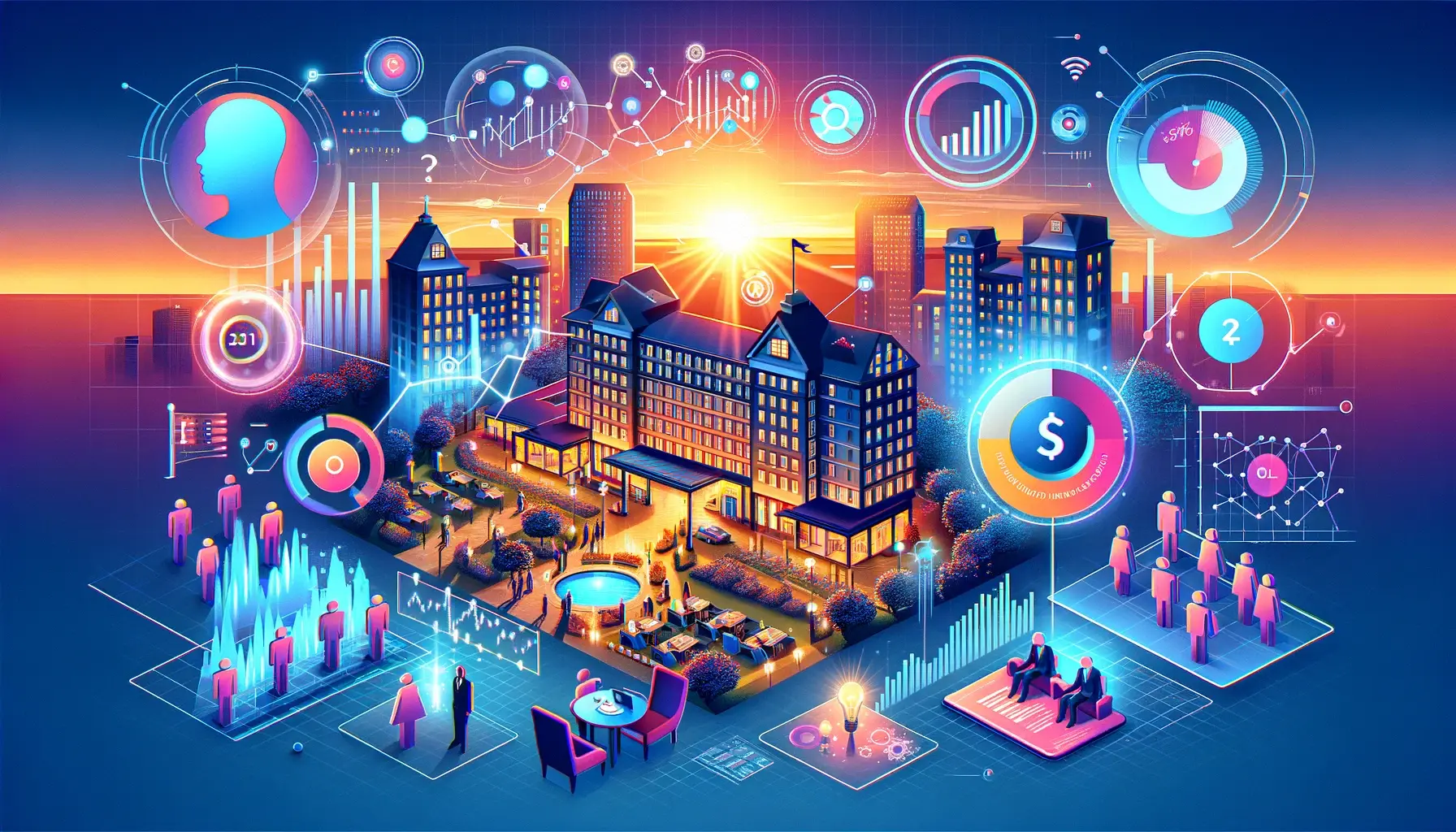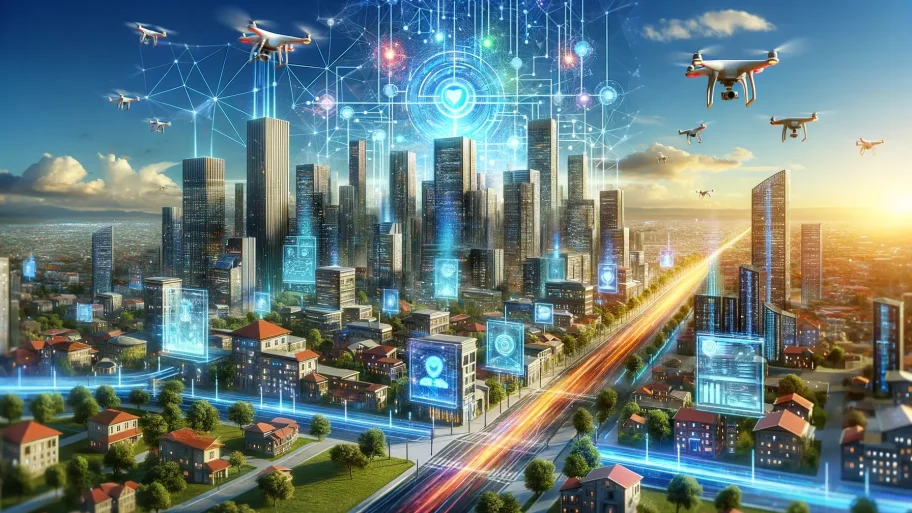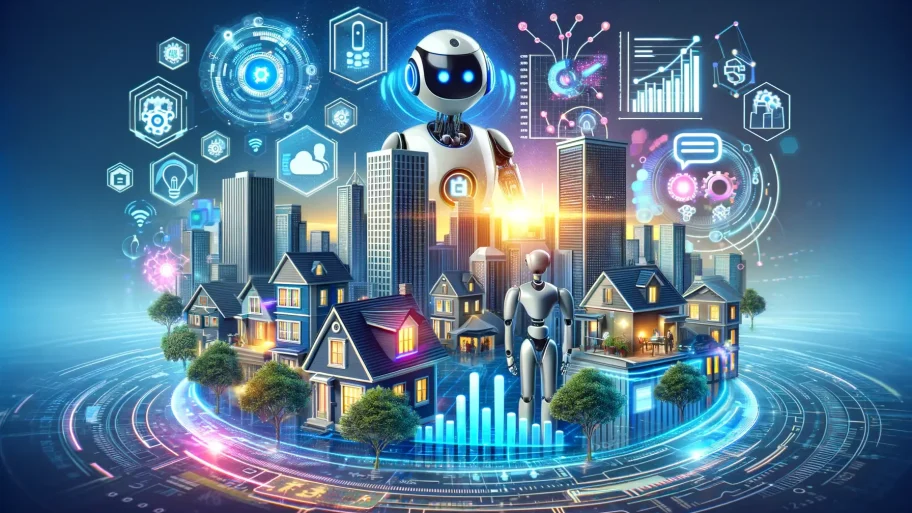Top 5 AI Use Cases In Hospitality Revenue Management
- By Matt

Attention Hospitality Professionals and Revenue Managers!
Encountering inconsistent pricing, demand forecasting errors, and operational inefficiencies? These challenges are immediate threats for those who neglect to integrate AI into their revenue management strategies now.
In this article, we’ll uncover how AI can revolutionize hospitality revenue management, helping you avoid these costly challenges.
Key Takeaways
- AI-powered Dynamic Pricing optimizes room rates in real-time for maximum revenue.
- AI-based Predictive Analytics forecasts demand accurately, enhancing inventory and pricing strategies.
- Personalized Guest Experience with AI tailors services to individual preferences, boosting satisfaction and loyalty.
- AI in Market Trend Analysis keeps hotels competitive by monitoring market trends and pricing strategies.
- Operational Efficiency through AI streamlines tasks, allowing staff to focus on higher-value activities.
Use Case #5: Operational Efficiency through AI
Starting our countdown at number 5 is the significant application of AI in enhancing operational efficiency, crucial for optimizing hotel operations and freeing up staff for more critical tasks.
The Burden of Inefficient Operations
Operational inefficiencies can lead to wasted resources and time, impacting the overall guest experience and hotel profitability. Manual handling of routine tasks is time-consuming and error-prone, reducing staff effectiveness.
This inefficiency adds stress to hotel management, making it challenging to maintain high standards and control costs.
Consequences of Poor Operational Efficiency
- Increased operational costs
- Reduced staff productivity
- Poor guest experience
- Lower profitability
AI-Enhanced Operational Efficiency
AI streamlines routine tasks such as check-ins, customer inquiries, and data analysis, significantly improving efficiency. This allows staff to focus on more critical tasks that enhance guest experiences.
Implementing AI for operational efficiency not only reduces costs but also boosts overall productivity and guest satisfaction.
Table 1: Key Benefits of AI-Enhanced Operational Efficiency
| Benefit | Description |
|---|---|
| Cost Reduction | Automating routine tasks reduces labor costs |
| Increased Productivity | Staff can focus on higher-value activities |
| Improved Guest Experience | More efficient operations lead to better service |
| Enhanced Efficiency | Streamlined processes boost overall efficiency |
Table 1 highlights the significant benefits of implementing AI for operational efficiency in hotels.
Revolutionizing Hotel Operations
AI in operational efficiency transforms hotel management by automating routine tasks, thus reducing errors and enhancing productivity. This approach not only optimizes resource use but also ensures high-quality guest services.
As AI technology continues to advance, operational processes will become even more streamlined, further improving efficiency and profitability.
Use Case #4: AI in Market Trend Analysis
Using AI for market trend analysis allows hotels to stay competitive by monitoring market changes and competitor pricing strategies in real-time.
The Challenges of Market Trend Monitoring
Failing to keep up with market trends can lead to pricing mismatches and lost revenue opportunities. Manual analysis is often slow and inaccurate, making it difficult to respond to changes promptly.
This lag in market trend monitoring adds stress to revenue management, affecting competitive positioning and profitability.
Challenges in Market Trend Analysis
- Inaccurate data interpretation
- Delayed responses to market changes
- Loss of competitive edge
- Revenue losses
AI-Driven Market Trend Analysis
AI analyzes large datasets to detect patterns and trends in the market, providing real-time insights. This allows hotels to adjust their strategies swiftly, maintaining a competitive edge.
Implementing AI for market trend analysis ensures that hotels can react promptly to market changes, optimizing pricing and inventory strategies effectively.
Table 2: Key Benefits of AI-Driven Market Trend Analysis
| Benefit | Description |
|---|---|
| Real-Time Insights | Immediate access to market data and trends |
| Competitive Edge | Stay ahead of competitors with up-to-date information |
| Optimized Pricing | Adjust prices according to market dynamics |
| Revenue Maximization | Capitalize on market opportunities swiftly |
Table 2 outlines the benefits of AI-driven market trend analysis for hotels.
Staying Ahead with AI in Market Analysis
AI-driven market trend analysis transforms how hotels monitor and respond to market changes, ensuring they remain competitive and maximize revenue opportunities.
As AI technology advances, market trend analysis will become even more precise, allowing hotels to adapt quickly to ever-changing market conditions.
Use Case #3: Personalized Guest Experience with AI
AI enhances the guest experience by analyzing preferences and tailoring services, leading to higher customer satisfaction and loyalty.
The Complexity of Personalizing Guest Services
Providing a personalized guest experience involves understanding individual preferences, which can be challenging without the right tools. Manual personalization is often inefficient and prone to errors.
This complexity in delivering personalized services adds stress to hotel operations, impacting guest satisfaction and loyalty.
Challenges in Personalizing Guest Experience
- Understanding individual preferences
- Inefficient manual processes
- Inconsistent service delivery
- Lower guest satisfaction
AI-Enhanced Personalization
AI analyzes data from various sources to understand guest preferences and behaviors, enabling hotels to offer tailored services and recommendations.
Implementing AI for personalized guest experiences increases satisfaction and loyalty by delivering services that meet individual needs and expectations.
Table 3: Key Benefits of AI-Enhanced Personalization
| Benefit | Description |
|---|---|
| Increased Satisfaction | Services tailored to guest preferences |
| Enhanced Loyalty | Personalized experiences build guest loyalty |
| Improved Service Delivery | Consistent and accurate service personalization |
| Data-Driven Insights | Understanding guest behaviors and trends |
Table 3 highlights the benefits of AI-enhanced personalized guest experiences in hotels.
Transforming Guest Services with AI
AI-driven personalization transforms guest services by accurately analyzing preferences and delivering tailored experiences, thus increasing satisfaction and loyalty.
As AI continues to advance, personalized guest services will become even more refined, enhancing the overall guest experience and operational efficiency.
Use Case #2: AI-Based Predictive Analytics
Leveraging AI for predictive analytics allows hotels to forecast demand accurately, improving inventory and pricing strategies to maximize revenue.
The Uncertainty of Demand Forecasting
Inaccurate demand forecasts can lead to overbooking or underbooking, causing revenue losses and operational inefficiencies. Manual forecasting methods are often slow and unreliable.
This uncertainty in demand forecasting adds stress to revenue management, impacting profitability and customer satisfaction.
Challenges in Demand Forecasting
- Inaccurate forecasts
- Overbooking or underbooking
- Operational inefficiencies
- Lost revenue opportunities
AI-Powered Predictive Analytics
AI uses machine learning algorithms to analyze historical data and predict future booking patterns accurately. This allows hotels to optimize their inventory and pricing strategies effectively.
Implementing AI for predictive analytics ensures more accurate demand forecasts, enhancing revenue management and operational efficiency.
Table 4: Key Benefits of AI-Based Predictive Analytics
| Benefit | Description |
|---|---|
| Accurate Forecasts | Reliable predictions based on comprehensive data analysis |
| Optimized Inventory | Better inventory management and allocation |
| Revenue Maximization | Optimal pricing strategies based on demand forecasts |
| Improved Efficiency | Streamlined operations and resource use |
Table 4 outlines the benefits of AI-based predictive analytics for hospitality revenue management.
Revolutionizing Demand Forecasting
AI-powered predictive analytics transforms demand forecasting by providing accurate predictions, optimizing inventory and pricing strategies to maximize revenue.
As AI continues to advance, demand forecasting will become even more precise, further enhancing revenue management and operational efficiency in the hospitality industry.
Use Case #1: AI-Powered Dynamic Pricing
Leveraging AI for dynamic pricing optimizes room rates in real-time based on demand, competition, and other factors to maximize revenue.
The Complexity of Dynamic Pricing
Adjusting room rates manually to match fluctuating demand and competition can be challenging and time-consuming. Inaccurate pricing strategies can lead to lost revenue opportunities.
This complexity in dynamic pricing adds stress to revenue management, impacting profitability and competitive positioning.
Challenges in Dynamic Pricing
- Inaccurate pricing strategies
- Revenue losses
- Time-consuming manual adjustments
- Competitive disadvantages
AI-Powered Dynamic Pricing
AI leverages real-time data and advanced algorithms to adjust room rates dynamically, ensuring optimal pricing strategies that maximize revenue based on demand and competition.
Implementing AI for dynamic pricing reduces the need for manual adjustments, enhances competitive positioning, and boosts overall profitability.
Table 5: Key Benefits of AI-Powered Dynamic Pricing
| Benefit | Description |
|---|---|
| Revenue Maximization | Optimal pricing strategies maximize revenue |
| Real-Time Adjustments | Dynamic pricing based on real-time data |
| Competitive Edge | Stay ahead of competitors with accurate pricing |
| Operational Efficiency | Reduces the need for manual price adjustments |
Table 5 highlights the significant benefits of implementing AI-powered dynamic pricing in hotels.
Transforming Pricing Strategies with AI
AI-powered dynamic pricing transforms how hotels adjust room rates, ensuring optimal pricing strategies that maximize revenue and enhance competitive positioning.
As AI technology continues to evolve, dynamic pricing strategies will become even more refined, further boosting profitability and operational efficiency in the hospitality industry.
Conclusion
In the rapidly evolving hospitality industry, inefficiencies, inconsistent pricing, and rising operational costs threaten your business.
Neglecting to integrate these technologies means missing out on opportunities for increased efficiency, cost savings, and enhanced guest experiences.
Latest Posts
- By Matt | 9 months ago
- By Matt | 1 year ago
- By Matt | 1 year ago
- By Matt | 1 year ago
- By Matt | 1 year ago
- By Matt | 1 year ago
- By Matt | 1 year ago
There are no results matching your search Reset filters?
Trending
There are no results matching your search Reset filters?






